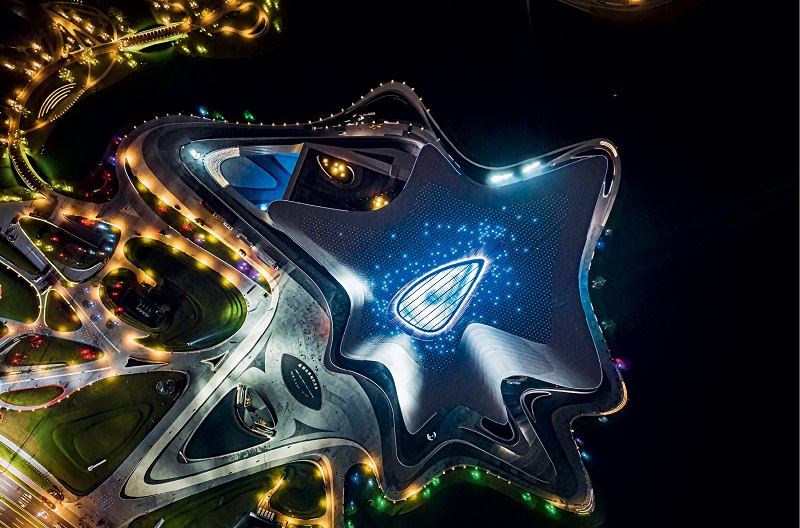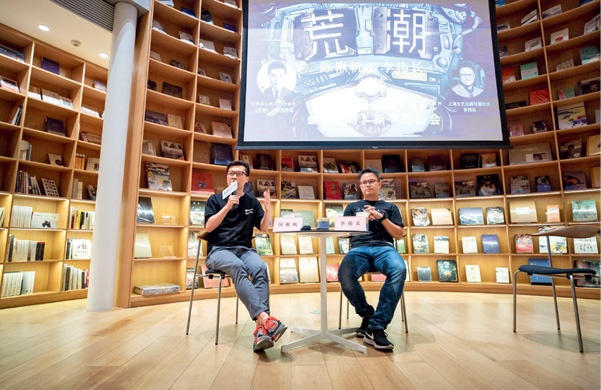Renowned writer Chen Qiufan believes AI can never replace the unique expressive abilities of humans.

A nighttime top-view of the illuminated Chengdu Science Fiction Museum, venue of the 81st World Science Fiction Convention in 2023.
“No matter how intelligent a machine becomes, it can never replace the timeless nourishment of literature. ChatGPT can write a love letter to you, but it can never love you.”
These words from French writer Camille Laurens recently went viral, fueling the ongoing debate about the implications of artificial intelligence (AI) for creative writing.
At the China Science Fiction Convention held in March, Liu Cixin, author of The Three-Body Problem and an acclaimed Chinese science fiction writer, acknowledged that AI can now produce full-length novels with coherent logic, and may eventually replace formulaic storytelling. In fact, as early as October 2023, The Land of Machine Memories, a novel created using generative AI by Professor Shen Yang’s team at the School of Journalism and Communication, Tsinghua University, anonymously entered the Jiangsu Youth Science Popularization and Science Fiction Competition and won second prize.
This raises an important question: Will AI replace human writers in literary creation or serve as an assistant? Furthermore, how will technological advances reshape science fiction writing – and the humanities in general?
In an exclusive interview with China Today, Chen Qiufan, vice president of the China Writers Association Science Fiction Committee, and honorary president of the World Chinese Science Fiction Association, said that AI cannot replace “the unique expressive abilities of humans.” A leading figure among China’s new generation of science fiction writers, Chen is known for his realist and New Wave style, heavily influenced by French philosophical thought. He believes science fiction can serve as a “synesthetic field” of dialogue between Chinese and French cultures.

Chen Qiufan (left) attends a book signing event for his release Waste Tide in Shanghai on September 14, 2019.
China Today: AI is now widely used in literature and film, and it has shown remarkable capabilities in science fiction writing. How do you view the relationship between AI and science fiction creation? Is AI changing the way writers work? Do you see it as a competitor or a partner?
Chen Qiufan: AI is indeed transforming how science fiction is written. Since 2017, I’ve been exploring how to use AI as a creative tool, including sparking dialogues, generating world-building elements, and even creating visual imagery or videos from scene descriptions. These tools serve as “inspirational catalysts,” opening up new paths of imagination. But that does not mean AI can replace human writers. Science fiction is not just about stacking imaginative elements and settings – it also requires cultural sensitivity, emotional nuance, and philosophical depth, areas where AI still falls short.
Will AI replace science fiction writers? I’m not worried about that. What matters more is how we interact with it and generate creative tension. That’s why I proposed an approach called “adversarial generation:” rather than having AI write a book for you, you engage with it in a complex exchange, pushing yourself to discover the uniqueness of human expression.
China Today: Your debut short story The Bait won the Teen Verne Award from Science Fiction World magazine when you were just 16 in 1997. Your science fiction is recognized for its realist and New Wave style. How has French science fiction literature or philosophy influenced and inspired your writing?
Chen Qiufan: As a child, I was a big fan of Jules Verne, who was one of the first foreign science fiction writers I read. Although I haven’t systematically read a lot of contemporary French science fiction, French philosophy has had a profound impact on me. For example, Gilles Deleuze and Félix Guattari’s concept of the “body without organs” reshaped my understanding of the fluidity of the human body in the post-technological era. Michel Foucault’s theory of the “disciplinary society” helped me in constructing the algorithmic social structure in The Algorithm for Life. The writings of Bernard Stiegler, Gilles Deleuze, Bruno Latour, and other philosophers have deepened my understanding of the world we live in. I’ve always felt that French philosophy is more sensitive and poetic than the Frankfurt School’s critique of instrumental rationality when it comes to technological alienation and individual destiny.
China Today: Your works have always emphasized the balance between technology and humanistic reflection, as seen in imaginative and profound science fiction novels like Waste Tide. How do you view the relationship among science fiction, technology, and the humanities?
Chen Qiufan: Waste Tide is set in my hometown, Guiyu, in the Chaoshan region of south China’s Guangdong Province. I conducted field research there and “approached fiction through nonfiction.” I’ve always wanted to understand how power, economy, ecology, and the human environment in that area have been constructed around the practice of “waste recycling.” From that base, I imagined possible future scenarios. The research experience provided the realistic foundation for the setting of the “e-waste recycling island.”
I believe the biggest responsibility of science fiction is not to glorify technology, but to help people see the social structures, human emotions, and ethical dilemmas behind these technological developments. For me, the tension between technology and the humanities is the source of energy that drives the structure of a novel.

Citizens browse and shop for books at Zhongshuge bookstore, known for its futuristic, sci-fi-inspired interior design, in Huai’an, east China’s Jiangsu Province.
 China Today: How has Waste Tide been received overseas? In your view, how can science fiction literature serve as a unique medium for cultural dialogue between China and France, or more broadly, China and the West?
China Today: How has Waste Tide been received overseas? In your view, how can science fiction literature serve as a unique medium for cultural dialogue between China and France, or more broadly, China and the West?Chen Qiufan: Waste Tide has been translated into more than 10 languages, including English, German, French, and Italian. The French edition, titled L'île de Silicium (The Island of Silicon), was published by Rivages and drew a favorable response from both readers and critics. In 2023, it won the Grand Prix de l’Imaginaire for Best Foreign Translated Work at the Utopiales International Science Fiction Festival in Nantes. I must credit the French translator for much of this success. He captured the essence of the original text accurately, given that translating science fiction is no easy task.
In my view, science fiction is already becoming a unique “synesthetic field” for cultural dialogue between China and the West. We have different technological trajectories, social evolution, and historical memories, all of which can be expressed through imaginative visions. French-speaking readers have a strong tradition of engaging with humanistic and social issues, and Chinese science fiction is shifting from “techno-optimism” to more complex reflections on humanity, making these exchanges even more meaningful.
China Today: With the continued advancement of technology, we are bound to face many structural anxieties, like cognitive, emotional, ethical, and institutional ones. You said a decade ago that “science fiction is precisely about confronting these anxieties.” If you had to describe the future of humanity in the AI era in a single sentence, what would it be?
Chen Qiufan: As Dr. Kai-Fu Lee and I envisioned in AI 2041 (French edition), the future of a human–AI symbiotic society is full of opportunities and challenges. Ultimately, it depends on how we coexist with another form of intelligence and how we use this “other” to enhance our own agency and level of consciousness.
If I were to summarize the human condition in the AI era in a single sentence, I would say, “Humanity will rediscover cracks and poetry of existence through the mirror of intelligent machines.”
We may become increasingly predictable to algorithms, since our emotions, preferences, and decisions can be quantified. But it is precisely in the “gaps” that algorithms cannot grasp, including emotional subtleties, ambiguities, and cultural metaphors, where we can still redefine what it means to be human. Science fiction is the kind of genre that helps us identify these very fissures. No matter how advanced technology becomes, the core of science fiction remains the human being, reflecting our values and our condition through imagined futures.